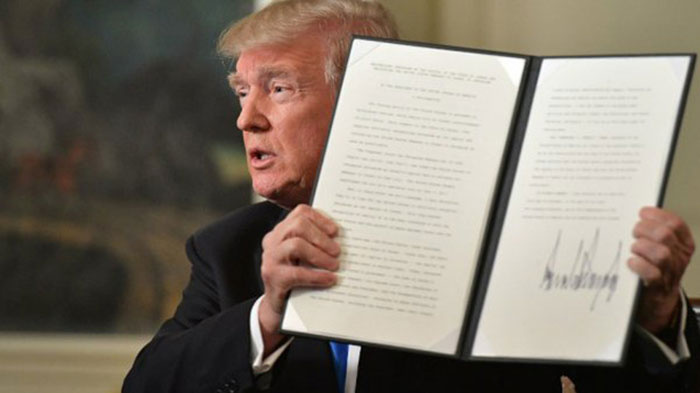Trump’s Embassy Move Pushes First Domino of Destruction

Senior CIA analyst John Nixon's Debriefing the President: The Interrogation of Saddam Hussein is an extraordinary book recently translated in Persian. It is not only a memoir but also a telltale document about motives, goals, and functions of what is probably the biggest unilateral US intervention in the Middle East over the past decade.
An interesting part of the book gives an account of the time CIA executives summoned Nixon for an absurd mission: to read all of Saddam Hussein's speeches in the past ten years thoroughly and try to find a clue to links with 9/11 attacks in parts he threatened the US.
The profiling job was not on an American citizen, but on the president of an independent country, a UN member. The mission ended up in the US and the UK's invasion of Iraq, without UN permission.
Profiling of the kind is a ploy ordinarily used by the political police to repress opponents and dissidents in undemocratic, authoritarian regimes, where judiciary has little power, with its independence spoiled in many ways. The book tells us that these extralegal coercive measures can be extended into the international scene.
Viewed optimistically, the international system is a half-democratic regime. Despite its democratic appearances, several means and control levers are always ready to distort and repress the public will. On a smaller scale, the international order can be viewed as a slavery with masters as superordinates and masses as subordinates.
The norms and rules of the system are designed and implemented by a club of powerful countries, which rarely recruits new members. The westernized Russia of the 1990s was accepted by the seven industrial powers but dismissed from the G8 after the Crimea crisis and Putin's authoritarian moves in the international scene.
Evil and rebel, terms invoked to label the states that refuse to conform, are familiar metaphors in international relations. Lists of sponsors of terrorism and violators of human rights, prepared with political considerations, are disciplinary tools in the hand of the "masters" to punish or reward other states.
US foreign policy after the Cold War has relied unprecedentedly on a kind of Schmittian reconstruction that highlights the ultimate use of power politics to expand national power. There is a Rightist, Schmittian ring to George W. Bush's sentence in the wake of September 11: "Either you are with us, or you are with the terrorists".
This approach to international issues means they respect international norms and rules, only when in their own interest. The US administration's decision to move its embassy to Bayt al-Maqdis, against all international law norms and UN resolutions, is a clear example of Schmitt's theory on decisions of the ruling side in extraordinary situations. That is to draw a border amid an extraordinary situation, suspension of all the rules available, to determine the territory of the government, i.e. to fabricate a difference between the inside and the outside, insiders and outsiders, and ultimately friends and foes.
Let us return to our own example of utilitarian regimes. The suspension of law, this extraordinary situation, is actually a general principle. Law is respected only if its enforcement is in the interest of the ruler. The United States' unilateralism in foreign policy extends this to the international sphere. Discrediting the UN and disregarding international cooperation upsets world security more than previously imagined. However, the problem does not lie only in the fact that some Palestinian now view the US an enemy rather than an intermediary. The point is anomie becomes regulated. Cases like the Kashmir conflict, Nagorno-Karabakh, Kirkuk, and tens of other examples can be ended by power politics, which does not mean a final settlement but further complication of the security enigma in international relations.
Repeated ignorance of international law, which happens to be Wstern in essence, by its founders has the latent potential to legitimize fanatics who undermine the very order.
Trump's motives may be trivial, rooted in predicaments created by his campaign's promises and transgressions, but the consequences of his actions are certainly tremendous, destructive, and long term.

